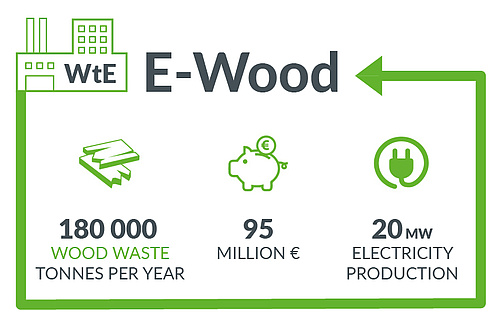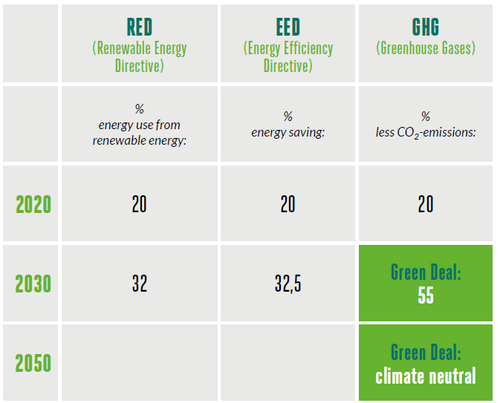Sustainability
Key figures
The wood waste facility E-Wood links the sustainable use of a waste product to the production of green or renewable energy and thus contributes to the climate targets for Europe and Flanders.

From 2022, E-Wood will treat 150 000 to 180,000 tonnes of wood waste per year. This will be uncontaminated treated (and potentially contaminated) wood waste as well as wood that comes from shredding wood waste or from the woody fraction of green waste, which is already separated before composting.
This 180,000 tonnes of wood waste will then produce 19 to 20 megawatts of green energy which, once converted into electricity, is destined for Flanders’ electricity grid. This prevents the emission of around 97,000 tonnes of CO2, comparable to avoided emissions from 45 wind turbines.
E-Wood fits within the Flemish policy, which favours small-scale (up to 20 MW) wood waste treatment facilities. The facility will treat the wood waste available in the region, which is currently transported to Germany and the Netherlands. In addition, in the Western-European market there is sufficient wood waste available that is eligible for treatment by E-Wood.
A sustainable solution
From 2022, E-Wood will offer a sustainable and competitive solution for the non-recyclable wood waste of Veolia and Indaver’s customers. The investment will bring a lot of opportunities for the further development of economic activities in the port region. At the same time, this new power plant will bring Flanders a step closer to the European climate targets related to reducing CO2 emissions and the generating more energy from renewable sources.
Climate targets
The aim of the European energy and climate policy is to reduce global warming. This legislation and regulations are an important source for the Flemish climate targets.
In 2018, the European Climate Targets from 2010 were tightened considerably. By 2030 this means:
- 32 % of European energy from a renewable source;
- 32.5 % less energy consumption;
- 55 % fewer CO2 emissions (Green Deal).

The target from the 2019 Green Deal is to emit 55% less CO2 by 2030 (reference year 1990). In 2050 the member states must be climate neutral.
Flanders needs green energy to achieve these climate targets. With the new E-Wood plant, where wood waste is used as a green fuel for green energy, Flanders is a step closer to achieving these targets.
The renewable energy production from E-Wood represents prevented CO2 emissions, equivalent to around 45 wind turbines.
As a sustainable power plant for wood waste, E-Wood works entirely on renewable energy. It therefore fits the new European climate policy perfectly.
Circular economy
In a circular economy, materials are re-used as much as possible and efficiently. As waste treatment companies, at Veolia and Indaver we recognise our responsibility to use waste streams as well as possible. We are therefore building a new facility for poor-quality wood waste. We are evolving towards a circular economy, in which waste is not the endpoint, it is merely a phase in the life cycle of a material, where we can recover new raw materials and energy.

Paul De Bruycker, Indaver CEO:
“Waste is not an end product, it is a phase in the life cycle of a material. With E-Wood we are recovering green energy from waste wood. This project is an example of the industry’s sustainable commitment to achieving the climate goals.”
